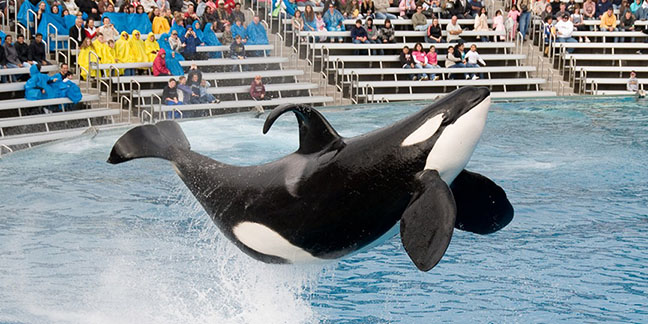Historic Last Dive at SeaWorld San Diego
January 20, 2017
On Jan. 8, Seaworld San Diego had it’s final killer whale show. Seaworld’s shows that highlight killer whales have struck controversy over the past few years, forcing them to make drastic changes to the structure of the show. However, Seaworld plans to replace the show with a more “natural” experience of the killer whales. The intention of the new show is to focus on educating audiences about the killer whales, instead of entertaining them with stunts that the whales do not typically perform in the wild.
SeaWorld’s big changes were prompted by the CNN sponsored documentary, Blackfish, released in July 2013. The documentary highlighted the treatment of killer whales in captivity and exposed SeaWorld by releasing information about the three human deaths that occurred in killer whale tanks. Blackfish, however, mainly focuses on the killer whale, Tilikum, from SeaWorld Florida who was captured at age 2 and was used as the main breeding whale. About 54% of SeaWorld’s whales contain Tilikum’s DNA.
Tilikum has received attention and notoriety from people all around the world for many reasons. However, not all have to do with his breathtaking performances in shows at SeaWorld. He is responsible for the deaths of trainers, Keltie Byrne and Dawn Brancheau, as well as civilian Daniel P. Dukes, a man found in Tilikum’s tank after hours whose story is a mystery. These deaths raised concern in the media about the credibility of SeaWorld and similar marine life parks.
Concerns for the future of these whales were not only expressed by the media, but other SeaWorld trainers also expressed their concerns for working with the whales going forward. Following the death of trainer Dawn Brancheau, the Occupational Safety and Health Administration stated that trainers were no longer allowed to have direct contact with the animal and there should be a barrier in between the person and the whale.
Along with the deaths, the documentary touched on the malnourishment of the mammals, stating that whales are plagued with illnesses in captivity that are not found in the ocean. They shared that there was one specific case in which a whale had to get their stomach pumped from trying to eat their way out of their holding cell. SeaWorld, however, rebuked this statement by saying that the whales have better quality of life in captivity and tend to live as long, if not longer than whales in the wild. This information went viral. Using the power of social media, animal activists formed a campaign against SeaWorld titled “SeaWorld of Hurt,” once again forcing SeaWorld to make a change in treatment of the whales.
On Jan. 6, just two days before SeaWorld San Diego’s last killer whale show Tilikum passed away due to a long term battle with lung disease. Tilikum’s legacy as the star of Blackfish, will live on however. According to animal rights activists, TIlikum’s death symbolizes and highlights the dangers and hardships killer whales face in captivity.
After the release of the documentary, topped with the campaigns against the park, SeaWorld suffered setbacks of over $11 Million. The release of the campaign led to the reworking of the shows, limiting the one on one human to whale contact. In March of 2010, SeaWorld released a new initiative that they were going to stop breeding in captivity. However, these activists would not stop until the whales were free from their duty as performers.
This sparked a new idea for SeaWorld, thus creating a new show that showcased the whales in their natural habitats to show audiences how whales typically live outside of captivity.. SeaWorld San Diego is the first to initiate the change, implementing the end of killer whale shows immediately, thus making history with their last killer whale show. As for the other two SeaWorld locations, they plan on slowly decreasing the amount of shows before eventually replacing them with the new shows; showing the truth behind killer whales.






